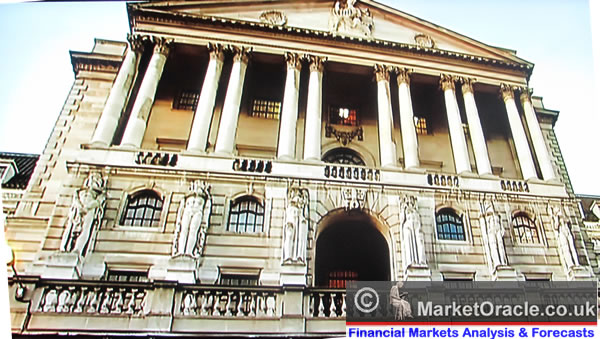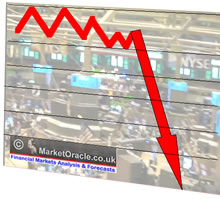Risk Trade Collapse Could Trigger Global Economic Depression
Economics / Great Depression II Nov 07, 2009 - 07:31 PM GMTBy: Bryan_Rich
 A lot of focus was given to the central banks’ meetings this week.
A lot of focus was given to the central banks’ meetings this week.
That’s because a lot of people would really like to see target rates start moving up from their low levels.
Some argue for higher rates because they think the world is returning to normal and the emergency policy responses need to be removed sooner rather than later to avoid a date with inflation.
Others are concerned that all of the ultra-easy money will result in asset price inflation, another bubble and ultimately another bust.
But clearly, the central banks have different concerns. This week …
- The Federal Reserve kept rates unchanged and made no material change to its statement. The markets were looking for some language change that would open the opportunity for an earlier rate hike. But the Fed did not oblige. Result: Dovish.
- Next it was the Bank of England. The BOE kept its benchmark rate unchanged and went further in the easy money hole by expanding, for a second time, its asset purchase program. Result: Dovish.
- And finally the European Central Bank followed suit and left rates unchanged and its bank liquidity program intact. Result: Dovish.
 |
| This week, central banks, including the BOE, maintained their dovish positions. |
To sum it up, the central banks continue to position themselves to accomdate the challenges in the real economy.
Now, for those who have been pleading for higher interest rates …
While I disagree with the first crowd, the one that thinks economies are returning to normal, I don’t completely disagree with the second crowd, those concerned about asset bubbles.
First, the U.S. economy and major global economies are nowhere near reaching a point of sustainable growth, much less normalcy. In fact the European Central Bank President, Jean-Claude Trichet, put it very plainly …
“I am a little a bit uneasy when I see [reports of a self-sustaining recovery occurring], because we have some green shoots here and there.”
The U.S. economy just printed its first positive GDP number in five quarters and most of it was attributed to government spending. Indeed, the purpose of government spending is to get the economy moving. But the idea is that in the process you create jobs … new industries … demand. And that just hasn’t happened.
So the people who think we’re back to business as usual have their heads in the clouds.
Now, for the second crowd …
Like I said, I don’t completely disagree with them. They fear another asset bubble. Some of my colleagues here at Weiss Research feel that way. And I think they’re dead right. It’s here. Stock markets, commodities, currencies … all 30 percent, 50 percent … even 100 percent higher in the past eight months!
 |
| I worry that another asset bubble is building in financial assets. |
Financial assets have rocketed from their March lows and for no fundamental economic reason. Is it because of the mountains of capital that have been plowed into the system through stimulus programs has ended up in financial assets?
In some cases, clearly yes …
Take China for instance. Its economy couldn’t absorb the massive half-trillion dollar stimulus and uber-aggressive bank lending. So that money found its way into investments like the Chinese stock market. So easy money can find its way into financial markets, for sure.
But can the major economies of the world, namely the U.S., afford to tighten up the belt to keep this under control? In my opinion, absolutely not! And that’s where I disagree with the second crowd.
Financial asset bubbles are one thing, and they are a risk. But most of the risk, at this stage, is to investor and consumer confidence. A bust that would bring financial assets back in line with the fundamentals of the economy would be another major blow to sentiment. And that could be the trappings for another recession — even a depression.
But the guaranteed danger right now is the real economy, real asset deflation, and evaporated demand. The threat of a sharper deterioration in the real economy leads to a complete stand-still in economic activity … i.e. a date with depression. That’s the battle central banks are most worried about.
If you’ve concluded that this looks like a lose-lose scenario for the U.S. and the highly interconnected global economy — I’m afraid you’re right.
A likely best-case scenario is a very slow and painful rebuilding period, where weak demand and lower standards of living rule.
The worst-case scenario: A bout with global depression.
As for bubbles in the financial markets, better known as the “risk trade,” that day of reckoning is coming when prices revert back to fundamental sanity. And the time might be closer than many people think …
Regards,
Bryan
P.S. I’m now on Twitter. Follow me at http://www.twitter.com/realbryanrich for frequent updates, personal insights and observations from my travels around the world.
This investment news is brought to you by Money and Markets . Money and Markets is a free daily investment newsletter from Martin D. Weiss and Weiss Research analysts offering the latest investing news and financial insights for the stock market, including tips and advice on investing in gold, energy and oil. Dr. Weiss is a leader in the fields of investing, interest rates, financial safety and economic forecasting. To view archives or subscribe, visit http://www.moneyandmarkets.com .
© 2005-2022 http://www.MarketOracle.co.uk - The Market Oracle is a FREE Daily Financial Markets Analysis & Forecasting online publication.



